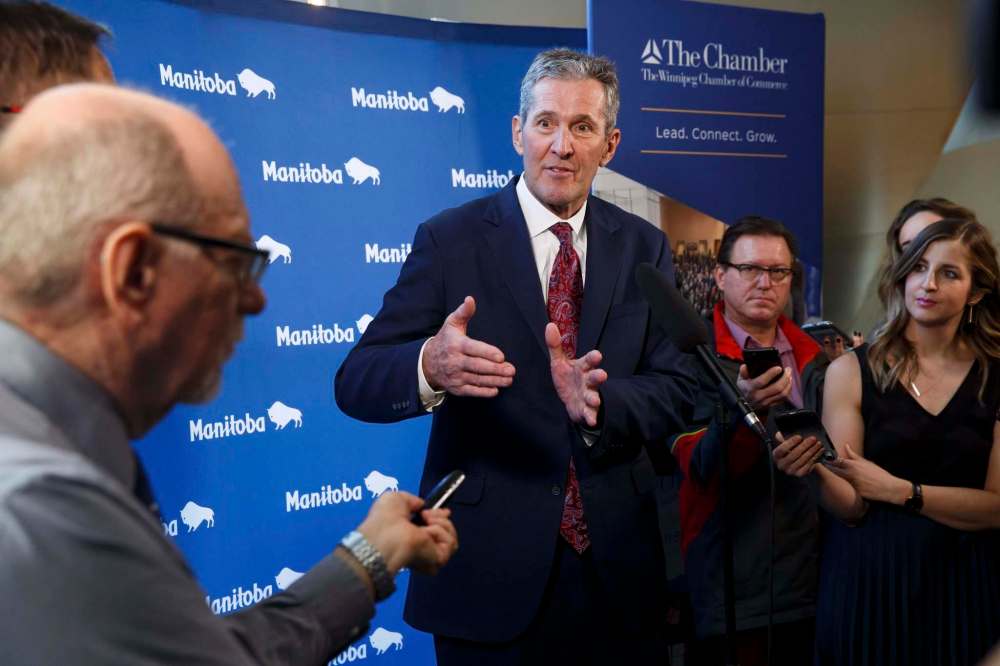Good fortune follows Manitoba’s premier
Read this article for free:
or
Already have an account? Log in here »
To continue reading, please subscribe:
Monthly Digital Subscription
$1 per week for 24 weeks*
- Enjoy unlimited reading on winnipegfreepress.com
- Read the E-Edition, our digital replica newspaper
- Access News Break, our award-winning app
- Play interactive puzzles
*Billed as $4.00 plus GST every four weeks. After 24 weeks, price increases to the regular rate of $19.95 plus GST every four weeks. Offer available to new and qualified returning subscribers only. Cancel any time.
Monthly Digital Subscription
$4.99/week*
- Enjoy unlimited reading on winnipegfreepress.com
- Read the E-Edition, our digital replica newspaper
- Access News Break, our award-winning app
- Play interactive puzzles
*Billed as $19.95 plus GST every four weeks. Cancel any time.
To continue reading, please subscribe:
Add Free Press access to your Brandon Sun subscription for only an additional
$1 for the first 4 weeks*
*Your next subscription payment will increase by $1.00 and you will be charged $16.99 plus GST for four weeks. After four weeks, your payment will increase to $23.99 plus GST every four weeks.
Read unlimited articles for free today:
or
Already have an account? Log in here »
Hey there, time traveller!
This article was published 27/12/2019 (2242 days ago), so information in it may no longer be current.
In politics, as in life, it is often better to be lucky than good. It could fairly be argued that no political leader embodies that principle better than Premier Brian Pallister of Manitoba.
For the past four years, Mr. Pallister has enjoyed good fortune on many levels: there have been relatively few significant floods or fires to battle; his political opponents are stuck in rebuilding mode and, as such, represent little in the way of an electoral threat; and revenues from federal transfer payments have been increasing at nearly unprecedented rates.
Earlier this month, Ottawa confirmed the amounts of money it will send to the provinces to support health and social programs, and through the federal equalization program that redistributes federal tax dollars from larger provinces to smaller ones.
Manitoba has long been a recipient of equalization.
Without hefty increases in federal transfers, Pallister would have a larger deficit and, arguably, would have to cut his government’s expenditures more deeply and broadly.
In total, Manitoba will receive $4.576 billion from Ottawa in the 2020-21 fiscal year, an increase of $318 million over the previous year. That is a huge number, given that in total, Manitoba spends just over $17 billion to operate government. But that is only part of the story of good fortune here.
In 2018-19, the most recent fiscal year for which we have a final accounting, the Pallister government held total spending to $17.138 billion, a $292-million increase over the previous year. In that same fiscal year, however, Manitoba received a $284-million increase in total transfer payments, the gross majority ($255 million) of which came from the single-year increase in equalization.

Strip away Mr. Pallister’s hyperbole about being smarter and more disciplined than his predecessors, and you have a premier who is on the brink of a balanced budget — though Manitoba’s auditor general would argue it’s already balanced — some three years earlier than forecast, largely because the formulas used to calculate federal transfers have rolled Manitoba’s way.
Without hefty increases in federal transfers, Mr. Pallister would have a larger deficit and, arguably, would have to cut his government’s expenditures more deeply and broadly. We should all be thankful that is not the case. Still, it would be interesting to imagine what life in Manitoba would be like had Mr. Pallister stuck to his original two-term plan to balance his budget.
As most Manitobans know, Mr. Pallister has invoked a stark austerity strategy when it comes to government spending. After promising in the 2016 election to “bend” the curve of spending increases, Mr. Pallister turned it sharply downward and is now providing annual funding increases to core services, such as health and education, that are below the rate of inflation.
And while Pallister shouldn’t be criticized for the fiscal good fortune he has encountered, under such circumstances, citizens might be entitled to expect a little more humility from a first minister who surely must recognize the magnitude of his luck.
Could Mr. Pallister have balanced the budget by the end of his second term while at the same time using some of the federal windfall to enhance core services or modernize them and make them more sustainable and effective?
Alas, that is a question Mr. Pallister seems disinclined to contemplate. His view seems to be that those who governed before him were rash and reckless fiscal managers, even though his government received more increases in federal transfers in its first two years than the former NDP government received in its past 10 years in power.
Even if it were true that Mr. Pallister is smarter and more disciplined than his predecessors, he is also much, much luckier. And while he shouldn’t be criticized for the fiscal good fortune he has encountered, under such circumstances, citizens might be entitled to expect a little more humility from a first minister who surely must recognize the magnitude of his luck.









